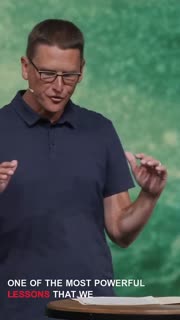David: An Imperfect Hero Leaving a Lasting Legacy
Devotional
Sermon Summary
Bible Study Guide
Sermon Clips
### Quotes for Outreach
1. "We believe that anybody can recover from anything that we we believe that there is there's this real thing called life's hurts habits and hang-ups that many of us end up getting into for a whole number of reasons but we also believe in the power and the reality of hope that Jesus is able to come alongside any person and bring them back to life and to help heal them and restore them and get them to a healthy place again." [23:35] (28 seconds)
2. "One of the most powerful lessons that we learn from David's life is that every one of us, despite our failures and our flaws, every one of us has the potential to be used by God in a powerful way. And so by the way, if this is your first Sunday with us here in the building, or maybe you're watching online for the very first time, I just think it's important that you know, as you're starting your relationship, with us, that we really believe that." [28:08] (21 seconds)
3. "Almost everybody comes to those moments. And if you haven't, most likely you will. And in those moments, we've got two choices. We can either choose to wallow in self-pity and play the victim and feel sorry for ourselves, or... Or, like David, we can develop a spirit of gratitude anyway." [33:09] (22 seconds)
4. "Parents, we all have goals and dreams for our children, don't we? It's one of the fun parts of being a parent, I think. But I also think it's important somewhere down the line that we communicate those goals to our children before it's too late." [41:11] (16 seconds)
5. "Can I ask you, if you were to die today, would you die with hope? Would you die excited about what was coming next? As we start to close this story, and then once again, don't miss next week. It's going to be a great ending. Let me just ask you, what legacy are you leaving?" [53:39] (22 seconds)
### Quotes for Members
1. "David died with some regrets. He did. He died with an unfulfilled dream. He wanted to be the one that built some massive, beautiful temple where the people of God could come and worship the Lord. But God said, no, you're a man of war. Now, by the way, that wasn't wrong. The fact that David was a man of war, that wasn't wrong in and of itself. That was, in fact, God's assignment to David to become a warrior and to physically go to war." [31:08] (60 seconds)
2. "He focused on the good things God enabled him to do anyway. He looked back, and then he considered his present situation, and he realized, God didn't choose me to build the temple. And I've got to deal with that. I'm not going to live in denial of that. He didn't let me build the temple. Yet, verse 4, Yet, the Lord, the God of Israel, chose me from my whole family to be king over Israel forever." [34:12] (32 seconds)
3. "David says, and you, my son, Solomon, here's what I want you to do. Acknowledge the God of your father, serve him with wholehearted devotion and with a willing mind. For the Lord searches every heart and he understands every desire and every thought, if you seek him, he will be found by you. But if you forsake him, he will reject you forever. So consider now for the Lord has chosen you to build a house as the sanctuary, be strong and do the work." [39:45] (28 seconds)
4. "I have one primary goal for my children, and it's that I want to spend eternity with them. That I want my children to grow up following Jesus. And I want them to marry someone who is following Jesus. And then I want them to have their own children and raise them up to follow Jesus. And then everything after that is gravy. Because our goal as parents should be one thing, to be to teach our children to know God and to seek God and to serve God." [42:36] (31 seconds)
5. "Can I ask you this morning, do you have any unfulfilled dreams? Are you living with any regrets today? Don't think for one second that you have to live powerless in addressing those unfulfilled dreams. Perhaps thinking creatively, there are still things that can be done to help you accomplish what God has placed on your heart to fulfill your dreams." [38:14] (24 seconds)
Ask a question about this sermon
1. "We believe that anybody can recover from anything that we we believe that there is there's this real thing called life's hurts habits and hang-ups that many of us end up getting into for a whole number of reasons but we also believe in the power and the reality of hope that Jesus is able to come alongside any person and bring them back to life and to help heal them and restore them and get them to a healthy place again." [23:35] (28 seconds)
2. "One of the most powerful lessons that we learn from David's life is that every one of us, despite our failures and our flaws, every one of us has the potential to be used by God in a powerful way. And so by the way, if this is your first Sunday with us here in the building, or maybe you're watching online for the very first time, I just think it's important that you know, as you're starting your relationship, with us, that we really believe that." [28:08] (21 seconds)
3. "Almost everybody comes to those moments. And if you haven't, most likely you will. And in those moments, we've got two choices. We can either choose to wallow in self-pity and play the victim and feel sorry for ourselves, or... Or, like David, we can develop a spirit of gratitude anyway." [33:09] (22 seconds)
4. "Parents, we all have goals and dreams for our children, don't we? It's one of the fun parts of being a parent, I think. But I also think it's important somewhere down the line that we communicate those goals to our children before it's too late." [41:11] (16 seconds)
5. "Can I ask you, if you were to die today, would you die with hope? Would you die excited about what was coming next? As we start to close this story, and then once again, don't miss next week. It's going to be a great ending. Let me just ask you, what legacy are you leaving?" [53:39] (22 seconds)
### Quotes for Members
1. "David died with some regrets. He did. He died with an unfulfilled dream. He wanted to be the one that built some massive, beautiful temple where the people of God could come and worship the Lord. But God said, no, you're a man of war. Now, by the way, that wasn't wrong. The fact that David was a man of war, that wasn't wrong in and of itself. That was, in fact, God's assignment to David to become a warrior and to physically go to war." [31:08] (60 seconds)
2. "He focused on the good things God enabled him to do anyway. He looked back, and then he considered his present situation, and he realized, God didn't choose me to build the temple. And I've got to deal with that. I'm not going to live in denial of that. He didn't let me build the temple. Yet, verse 4, Yet, the Lord, the God of Israel, chose me from my whole family to be king over Israel forever." [34:12] (32 seconds)
3. "David says, and you, my son, Solomon, here's what I want you to do. Acknowledge the God of your father, serve him with wholehearted devotion and with a willing mind. For the Lord searches every heart and he understands every desire and every thought, if you seek him, he will be found by you. But if you forsake him, he will reject you forever. So consider now for the Lord has chosen you to build a house as the sanctuary, be strong and do the work." [39:45] (28 seconds)
4. "I have one primary goal for my children, and it's that I want to spend eternity with them. That I want my children to grow up following Jesus. And I want them to marry someone who is following Jesus. And then I want them to have their own children and raise them up to follow Jesus. And then everything after that is gravy. Because our goal as parents should be one thing, to be to teach our children to know God and to seek God and to serve God." [42:36] (31 seconds)
5. "Can I ask you this morning, do you have any unfulfilled dreams? Are you living with any regrets today? Don't think for one second that you have to live powerless in addressing those unfulfilled dreams. Perhaps thinking creatively, there are still things that can be done to help you accomplish what God has placed on your heart to fulfill your dreams." [38:14] (24 seconds)










